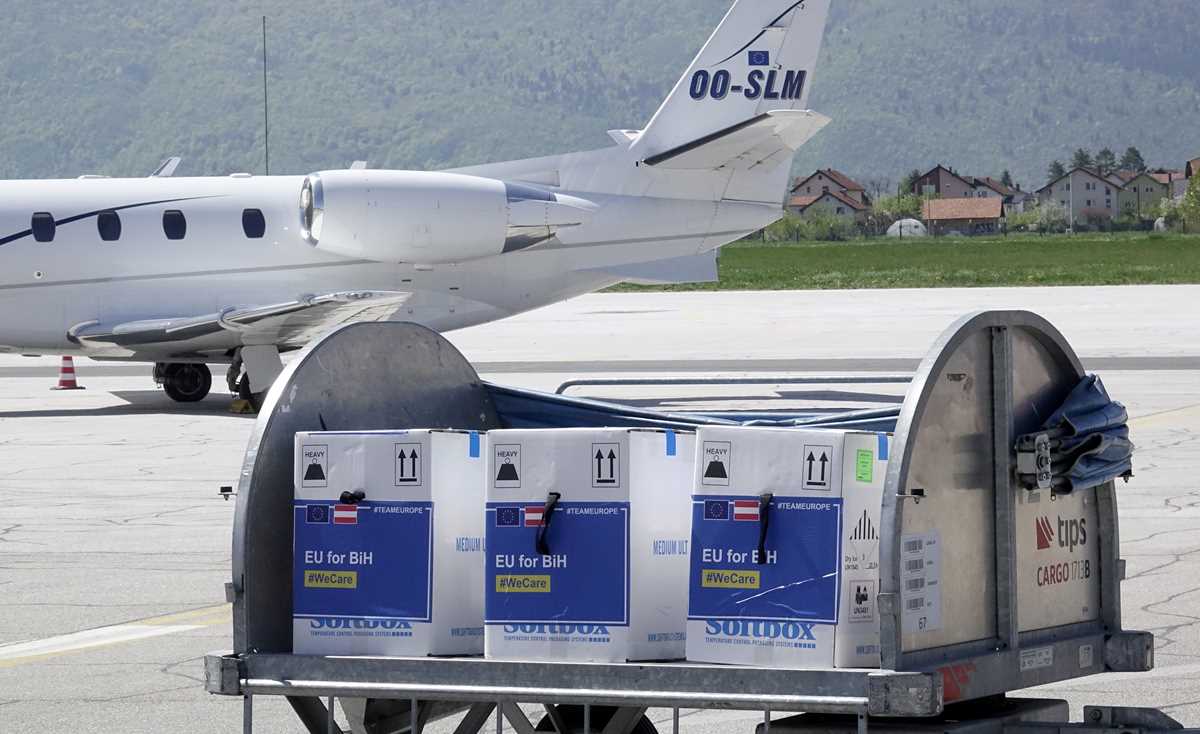 In this May 4, 2021, file photo, a container with boxes of the Pfizer vaccine for COVID-19 is delivered at the Sarajevo Airport, Bosnia. The head of the World Trade Organization said Friday, May 7, the U.S. administration’s call to remove patent protections on COVID-19 vaccines could help expand fair access to vaccines but might not be the most “critical issue,” as officials in Europe increasingly insisted that more vaccine exports are the more pressing priority. (AP Photo/Eldar Emric, File)
In this May 4, 2021, file photo, a container with boxes of the Pfizer vaccine for COVID-19 is delivered at the Sarajevo Airport, Bosnia. The head of the World Trade Organization said Friday, May 7, the U.S. administration’s call to remove patent protections on COVID-19 vaccines could help expand fair access to vaccines but might not be the most “critical issue,” as officials in Europe increasingly insisted that more vaccine exports are the more pressing priority. (AP Photo/Eldar Emric, File) In this April 1, 2021 file picture, World Trade Organisation (WTO) Director-General Ngozi Okonjo-Iweala attends a news conference at WTO headquarters in Geneva, Switzerland. The head of the World Trade Organization said Friday, May 7, 2021, the U.S. administration’s call to remove patent protections on COVID-19 vaccines will give an impetus to negotiations to resolve access inequity but such a waiver might not be the “critical issue” against the pandemic. (Denis Balibouse/Pool via AP)
In this April 1, 2021 file picture, World Trade Organisation (WTO) Director-General Ngozi Okonjo-Iweala attends a news conference at WTO headquarters in Geneva, Switzerland. The head of the World Trade Organization said Friday, May 7, 2021, the U.S. administration’s call to remove patent protections on COVID-19 vaccines will give an impetus to negotiations to resolve access inequity but such a waiver might not be the “critical issue” against the pandemic. (Denis Balibouse/Pool via AP)GENEVA (AP) — The head of the World Trade Organization said Friday the U.S. administration’s call to remove patent protections on COVID-19 vaccines could help expand fair access to vaccines but might not be the most “critical issue,” as officials in Europe increasingly insisted that more vaccine exports are the more pressing priority.
WTO Director-General Ngozi Okonjo-Iweala told a virtual conference that the trade body aimed to find a “pragmatic solution that assures access to developing countries to deal with vaccine inequity, whilst at the same time making sure we don’t disincentivize research and innovation.”
Activists and humanitarian institutions cheered the American reversal in policy Wednesday and urged others to follow suit in order to remove the intellectual property protections on the COVID-19 vaccines. They argue that would allow more factories around the world to produce the shots, increasing the supply, especially in poorer countries. The decision ultimately is up to the 164-member WTO, and if just one country votes against a waiver, the idea will fail.
While many world leaders welcomed the U.S. step, few see any waiver as the only or even best way to expand access to vaccines and end the pandemic — and they've taken the U.S. to task for not sharing more of the vaccines that already exist with the rest of the world.
For instance, Germany, a research powerhouse with strong biotech and pharmaceutical sectors, spoke out against waiving the protections.
“The main issue is not the question of patents. The main issue is the question of production capacity," German Health Minister Jens Spahn said, noting that producing vaccines like one developed by German firm BioNTech — and manufactured with Pfizer —is very complicated.
It “is not something you can simply do with a license in some factory somewhere, somehow, whether it’s in Germany or India or Chile,” he said.
Instead, he stressed — as the pharmaceutical industry has — that developed countries whose vaccination campaigns are going well should export more shots.
“We’ll be exporting a lot more. I can only welcome if the United States change their policy and make vaccination doses available for other countries," he said.
Ulrike Demmer, a German government spokeswoman, also echoed many in the industry and some analysts in noting that “the limiting factor in vaccine production is production capacity and high quality standards, not patents.”
Some, however, have argued that there are factories that could produce the shots if the protections were suspended and the know-how shared.
But in remarks to the Florence-based European University Institute’s annual State of the Union conference, the WTO's Okonjo-Iweala said that the patent waiver “may not be the critical issue” on increasing vaccine volume.
Other key steps include reducing restrictions on the export both of vaccines and the ingredients needed to make them, sharing the know-how behind the shots, training manufacturing personnel and increasing manufacturing capacity globally.
___
Winfield reported from Rome. Associated Press writers Frank Jordans and Dorothee Thiesing in Berlin contributed to this report.
___
Follow all of AP’s pandemic coverage at https://apnews.com/hub/coronavirus-pandemic, https://apnews.com/hub/coronavirus-vaccine and https://apnews.com/UnderstandingtheOutbreak.
Before you make your next trade, you'll want to hear this.
MarketBeat keeps track of Wall Street's top-rated and best performing research analysts and the stocks they recommend to their clients on a daily basis.
Our team has identified the five stocks that top analysts are quietly whispering to their clients to buy now before the broader market catches on... and none of the big name stocks were on the list.
They believe these five stocks are the five best companies for investors to buy now...
See The Five Stocks Here
As the AI market heats up, investors who have a vision for artificial intelligence have the potential to see real returns. Learn about the industry as a whole as well as seven companies that are getting work done with the power of AI.
Get This Free Report